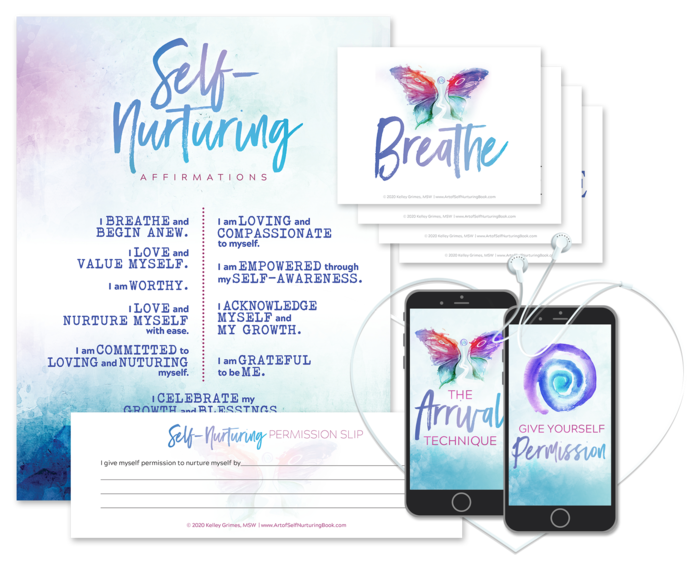 “The thing that is really hard and really amazing is giving up on being perfect and beginning the work of becoming yourself.” ~Anna Quindlen
“The thing that is really hard and really amazing is giving up on being perfect and beginning the work of becoming yourself.” ~Anna Quindlen
Many of us have been sold a myth that we unconsciously aspire to—that we can do and have it all. As a result, we often wear our superwomen capes with pride and derive much of our value and worth caring for everyone in our lives, leaving little time to nurture ourselves.
To compound these overwhelming expectations, we also believe that we should be able to do it all perfectly. Since these unrealistic goals can never truly be met, we inevitably end up feeling overwhelmed, exhausted, and filled with an unsettling sense that there is something wrong with us.
We may look around and think everyone else has life figured out and that we are the only ones who do not measure up. The problem with comparing ourselves to others while trying to meet this unattainable ideal is that it feeds our sense of not being good enough and further erodes our self-confidence and self-worth. Ironically, this sense of not feeling good enough can further motivate us to strive to be perfect. We may even believe that if we could just be the “perfect” daughter, mother, wife, friend, student, employee then we would be appreciated, valued, and even celebrated.
The problem with buying into the myth of perfectionism, is that it is not realistic or sustainable. Instead of feeling good about all we do, we end up judging and criticizing ourselves for falling short. The more we believe we need to be perfect, the more unrealistic our expectations of ourselves become, as does the amount of energy we need to fulfill these expectations.
No wonder why so many of us end up feeling overwhelmed and exhausted! And no wonder why so many of us walk around with inner critics who are harsh, judgmental, and provide us a litany of evidence that we are not living up to our standards.
It truly is an impossible situation.
Whether you believe the myth that you should be perfect or your high expectations of yourself are fed by the belief that you should have it all, do it all, and be everything to everyone, unrealistic expectations are anything but self-nurturing. And as Anne Wilson Schaef reminds us, “Perfectionism is self-abuse of the highest order.”
Not only is perfectionism self-abuse, but it undermines the important work of becoming ourselves and limits our creativity, authenticity, evolution, and growth. Perfectionism robs us of our value and worth and focuses our attention on the negative rather than on our potential. And our unrealistic expectations impact our relationships not only with ourselves, but with others, which fuels our guilt and shame. Perfectionism feeds a scarcity mindset and undermines our ability to receive blessings and see the infinite possibilities available to us.
I love Brene Brown’s distinction that “Understanding the difference between healthy striving and perfectionism is critical to laying down the shield and picking up your life. Research shows that perfectionism hampers success. In fact, it’s often the path to depression, anxiety, addiction, and life paralysis.”
What if instead of holding ourselves to unrealistic and unattainable expectations, we give up on being perfect and choose to cultivate nurturing expectations of ourselves.
This empowering and liberating choice will support us in cultivating a reserve of compassion, self-love, gratitude, perspective, and energy so that we can show up authentically, courageously, and fully engaged in our lives.
Here are 5 steps to giving up perfectionism in order to thrive:
1.Give yourself and others permission not to be perfect.
This is an important first step and intention in the healing process. When we declare that we do not expect ourselves or others to be perfect, we create healthier and more encouraging environments where learning and growth are valued and appreciated.
I have started saying in every group that I am a part of that we do not have to be perfect, but we do need to show up. This regular affirmation of letting go of perfectionism is my way of giving myself and others permission to be authentic, take risks, learn from our mistakes, and intentionally develop a culture of appreciation together.
2.Notice when you are holding yourself to unrealistic expectations and choose to change them.
Awareness is critical to making any type of change. Commit to cultivating a spirit of curiosity and non-judgment as you regularly reflect on the expectations you hold for yourself. Start by writing down the expectations you have and then challenge the unattainable ones. Recognize when you are expecting yourself to be perfect and notice the impact it has on your self-worth and belief in yourself. Then reflect on how changing the expectations could open you to more possibilities to be yourself, learn, and grow. For instance, if you believe that you should make everyone happy, pause and recognize how unrealistic that expectation is. Then tell yourself instead, I am loving and supportive to people, no matter how they respond.
Remember you do not need to be perfect in this process. The power resides in your awareness and choice.
3.Respond to yourself with compassion when you make a mistake.
When we buy into the myth of perfectionism, mistakes invoke shame. Instead of understanding that we made a mistake, we often believe we are the mistake. Getting stuck in our shame decreases our ability to learn and grow from our mistakes. If we choose instead to treat ourselves with kindness and compassion when we make a mistake, we actively release our perfectionist expectations and teach others by our example. With each act of self-compassion, we support a new culture of learning and growth in our families, friend groups, faith communities, and workplaces, and the positive ripple effects on our relationships are endless.
As Sharon Salzberg asserts “When we relate to ourselves with loving kindness, perfectionism naturally drops away.”
4.Cultivate a gratitude practice.
Since perfectionism highlights what is not going well, an antidote to perfectionism is recognizing what is going well in our lives. A gratitude practice is the easiest way to refocus on what is going well and offers us perspective to acknowledge what we have done well and how we have grown. Indeed, what we focus on is what we attract more of in our lives, and so recognizing what we are grateful for quiets our inner critic and unplugs us from the expectation of perfection.
Take a moment now to acknowledge something you are grateful for about yourself. Then give yourself credit for already letting go of perfectionism and choosing to thrive.
5.Choose authenticity over perfection.
When we decide that showing up courageously as our authentic selves is more important than trying for an unattainable goal, we will more easily release our desire for perfection. Choosing authenticity over perfection is empowering and encourages us to embrace our uniqueness, learn from our experiences, and express who we really are. I believe it is only when we transform our unrealistic expectations that we make room for the authentic expression of who we truly are, and then are able to truly love ourselves.
As Vironika Tugaleva reminds us, “There is no way to genuinely, powerfully, truly love yourself while crafting a mask of perfection.”
I invite you to join me in giving up on being perfect and choose instead to express your authentic truth. When you do, choosing to nurture yourself will become an act of love and courage for without this vehicle for knowing yourself, you may end up playing many roles and positions in your life, but never being fully who you are meant to be.
And remember there is no expectation that you do this work perfectly, but please do show up!
Sending you peace, love and gratitude, Kelley




